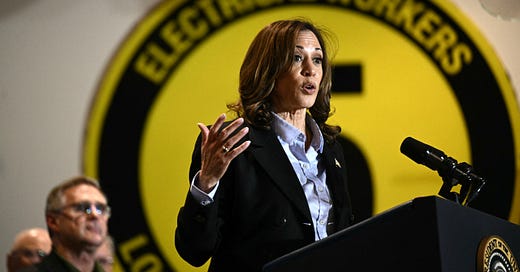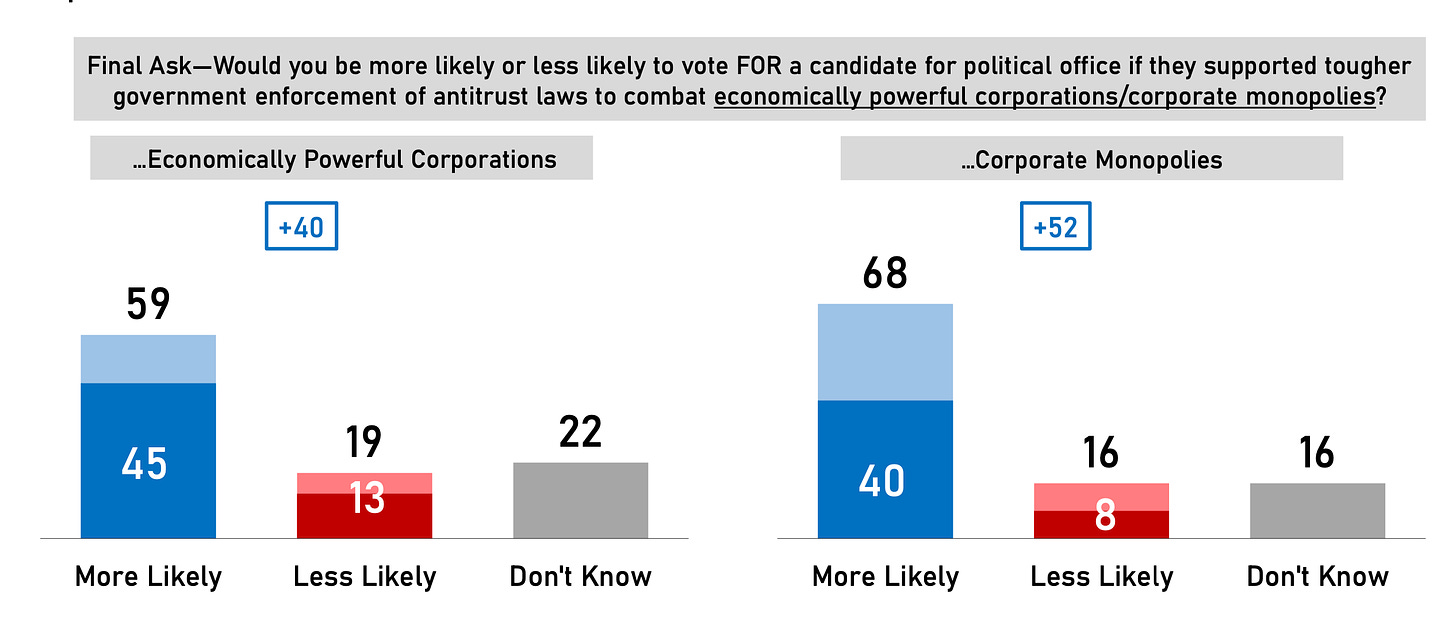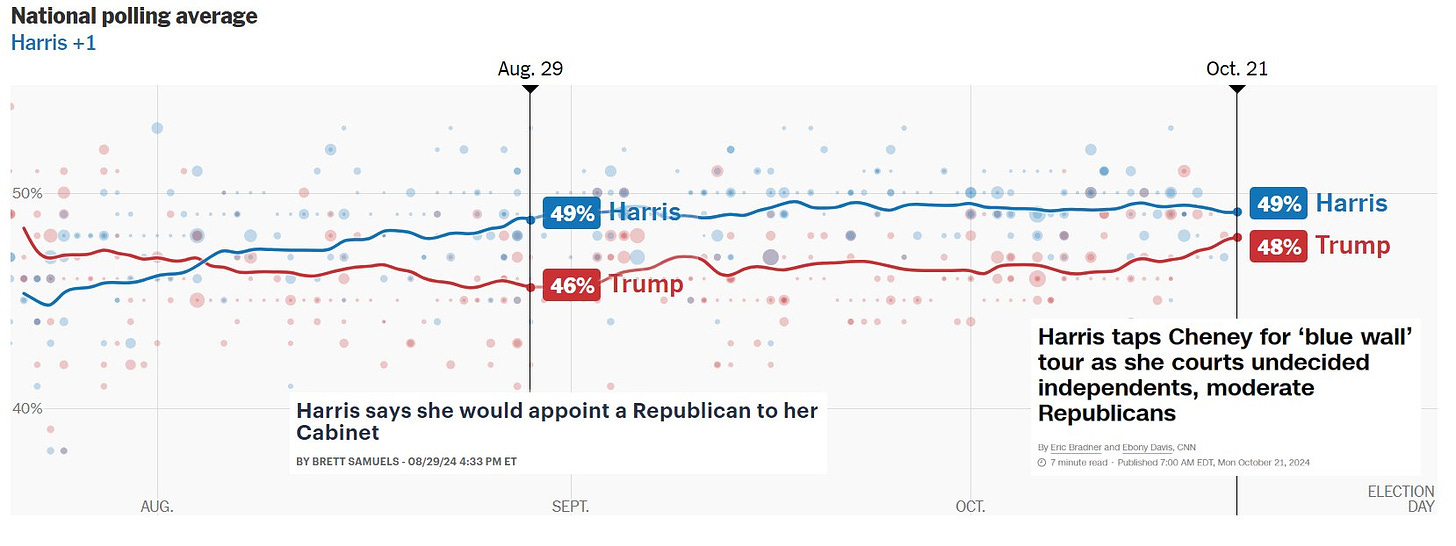The campaign to save Kamala’s campaign
The data is unambiguous: people like cheap groceries, not Liz Cheney
Welcome to a Wednesday night edition of Progress Report.
Over the past 36 hours, Donald Trump has been credibly accused of admiring Hitler, ripping off the family of a murdered American soldier, and groping a young woman while hanging out with his buddy Jeffrey Epstein. And because he’s Donald Trump, it’s exceedingly likely that none of those contemptible allegations, each of which is almost guaranteed to be true, will still be in the news 36 hours from now.
It’s a depressing comment on the legacy media’s surrender to myopia and society’s descent into cynicism, but not at all a surprise at this point in our cultural ice age. Tonight, instead of lamenting the national nihilism, we’ve got a report on the strategy that progressives and labor allies think can finally vanquish Trumpism, the data that backs their argument, and the fight to implement it before time runs out.
Note: To make this work as accessible as possible, I’ve lowered the price for a paid subscription back down to Substack’s $5 minimum. If you can’t afford that right now, please email me and I’ll put you on the list for free. Every paid subscription makes it easier for me to comp one while becoming sustainable.
Democracy, if they can afford it
Armed with polls and other data points, progressive leaders and strategists have launched a campaign to redirect Vice President Kamala Harris’s campaign in a more populist direction in the two weeks before Election Day.
The effort launched in earnest on Tuesday, when several left-leaning economic advocacy groups released polling that found broad support for shifting the balance of power in the American economy toward workers and consumers.
The American Antitrust Institute and Committee to Support the Antitrust Laws together sponsored a swing state survey that revealed deep antipathy for concentrated corporate power. According to their survey, nearly three-quarters of voters in the seven key swing states hold an unfavorable opinion of corporate monopolies, including 68% of Republicans.
The survey also found that 63% of swing state voters believe that higher prices on goods and services are a result of corporate price-fixing. That understanding of post-pandemic inflation as a series of predatory, profit-driven business decisions illuminates why two-thirds of respondents supported prosecuting wealthy corporations that rig the marketplace.
More than half of swing state voters also said that they’d be more likely to back a candidate who promised to crackdown on price-gouging — a question no doubt designed to send a message to Harris and other Democrats who have moved away from such messaging over the past month despite the success it produced in the late summer and early fall.
Seeking to quickly define herself after replacing Joe Biden as the Democratic nominee for president, Harris rolled out a series of policy proposals in July and August aimed at helping young families and reducing the cost of living. Calls for cracking down on price gouging — which polled at unprecedentedly high levels — and raising taxes on the wealthy contributed to a comfortable polling lead that peaked after Harris’s debate victory against Donald Trump.
Her campaign has since pivoted to appealing to a vanishingly thin band of Trump-averse neoconservatives, which has coincided with a statistically significant regression in critical battleground state polls.
According to a new Reuters/Ipsos poll, the economy remains the most salient issue for voters. Overall, 70% of voters said that their cost of living was on the wrong track and 65% said the same of the broader economy. Nearly half of respondents (46%) said they thought Trump would do better at managing the economy, while just 38% gave the nod to Harris.
In a new swing state poll from Bloomberg and Morning Consult, more than a third of voters said that the economy was the most important issue in this election. Respondents gave Trump a five point edge over Harris on the economy, 50-45%. All told, Trump and Harris were tied among likely voters at 49% apiece in all seven swing states, indicating that a more robust economic message from Harris could make the difference.
Further bolstering the argument for a Harris pivot back toward economic populism is the fact that Trump is gaining support from the traditional Democratic constituencies — including young men of color — who tend to be far less economically secure.
Democracy won’t win elections
All of this regression has coincided with Harris’s open courting of Silicon Valley and Wall Street billionaires (who in turn refuse to publicly endorse her).
It’s been a steady drumbeat of public appeals to the elite, including high-profile, high-dollar fundraisers that drew media coverage from coast to coast; leaks to reporters about business leaders that could serve in a Harris administration; and regular appearances by surrogates like Mark Cuban, who has frequently undermined Harris’s most basic populist promises.
Backing off the economic populism has coincided with an odd decision to focus on the one thing that has never seemed to bug voters: Donald Trump’s perceived willingness to blow up political norms and wipe out the sclerotic establishment.
The Bloomberg poll found that democracy topped the list of concerns for just 10% of voters, and a second study made public on Tuesday underscored just how little wage-earning, swing state voters are moved by existential concerns about democratic institutions. Conducted by the Center for Working-Class Politics, the poll focused on working and middle class voters in Pennsylvania, the largest and most demographically varied of the major swing states.
Researchers cross-tested messages that reflected each campaign’s major themes, pitting seven Harris-coded statements against seven Trump-style messages. In many cases, they used the same language as the candidates, and always reflected the most common rhetoric.
The message that reflected Harris’s current approach, urging voters to “defend our freedom and our democracy” against “convicted felon” Donald Trump, was a total bust across all demographics.
Among blue-collar voters, a group that leans Republican, the democratic threat message was a whopping 14.4 points underwater relative to the average support for Trump’s messages. And among more liberal-leaning service and clerical workers, it was also the least popular message, finishing only 1.6 percentage points ahead of the Trump average. Even among professionals, the most liberal of the bunch and the group that liked the message the best, the message barely outperformed Trump’s messages.
Broken down by partisanship instead of profession/class, the message performed even worse, with Republicans preferring Trump’s message by over 75 points. If the goal is to win over some Republicans, it’s clear that attacking Trump’s character — which winds up feeling like an attack on voters’ character — is far less effective than promising them some better material gain.
On the other hand, the “strong populist” messaging, which mixed progressive economic policy with hostility toward “billionaires,” “big corporations” and the “politicians in Washington who serve them,” tested best with all three groups.
This is hardly a surprise — in mid-September, a Data for Progress poll found that 71% of Americans agreed that billionaires should pay more in taxes, including 53% of Republicans.
The Data for Progress poll was released around the same time that Harris confirmed her support for a law that required billionaires to pay some minimum annual tax. Her campaign has stayed silent on just how much she’d want to billionaires to pay each year — President Biden has backed a 25% annual levy — and Harris has largely stopped touting it on the campaign trail.
Additional attempts at campaign interventions are ongoing, through backchannels, columns from longtime partisans, and news stories sounding the alarm about a potential crumbling of Midwestern “Blue Wall” states with a mass of working class voters.
Work in Progress
The week began with the vice president visiting those three midwestern swing states with Liz Cheney, but there are signs that a turnaround is now in progress.
Labor unions have have been hard at work trying to communicate the stakes to their own members, with the United Autoworkers in particular enjoying some breakthroughs. A poll of swing state locals released by the UAW on Wednesday found that members in those seven states backed the vice president by 22 points; among members who have heard about the election directly from the union — whether digitally or through a door-to-door campaign that has thus far hit 200,000 member households — Harris leads Trump by 29 points.
Groups like Future Forward, the major Harris-aligned PAC, have also put millions behind ads geared toward working people, even if the campaign hasn’t had its eye on those voters over the past few weeks. And even that seems to be changing.
Harris herself,m came down hard on Trump for dodging a question about raising the minimum wage during his McDonald’s stunt in Pennsylvania, stealing some headlines after his cynical antics on the deep-fryer dominated on Sunday. In tonight’s CNN town hall event, Harris went further, promising to crack down on price-gouging on essential goods, taking her back to some of her original and most popular campaign promises.
More than a quarter of the country has already cast a ballot, but those voters tend to be the most committed and politically engaged. There is still time to convince the fence-sitters that Democrats are willing to fight for their rights, but only if they start right away.
Wait, Before You Leave!
Progress Report has raised over $7 million dollars for progressive candidates and causes, breaks national stories about corrupt politicians, and delivers incisive analysis, and goes deep into the grassroots.
None of the money we’ve raised for candidates and causes goes to producing this newsletter or all of the related projects we put out. In fact, it costs me money to do this. So, I need your help.
For just $5 a month, you can buy a premium subscription that includes:
Premium member-only newsletters with original reporting
Financing new projects and paying new reporters
Access to upcoming chats and live notes
You can also make a one-time donation to Progress Report’s GoFundMe campaign — doing so will earn you a shout-out in the next weekend edition of the newsletter!








I have wondered about the Harris strategy of chasing wobbly Republicans. It’s a margins race, they say, and picking off a sliver of Republicans may make the difference. On the other hand, what does it do for enthusiasm? Not much, I’d say. Wouldn’t exciting the base be better?
Please make sure, if you’re voting early, that you’re going to an “early voting” location. Here in NYS, the Election Day, and early voting places, are NOT the same! Check with your Board of Elections to be sure.